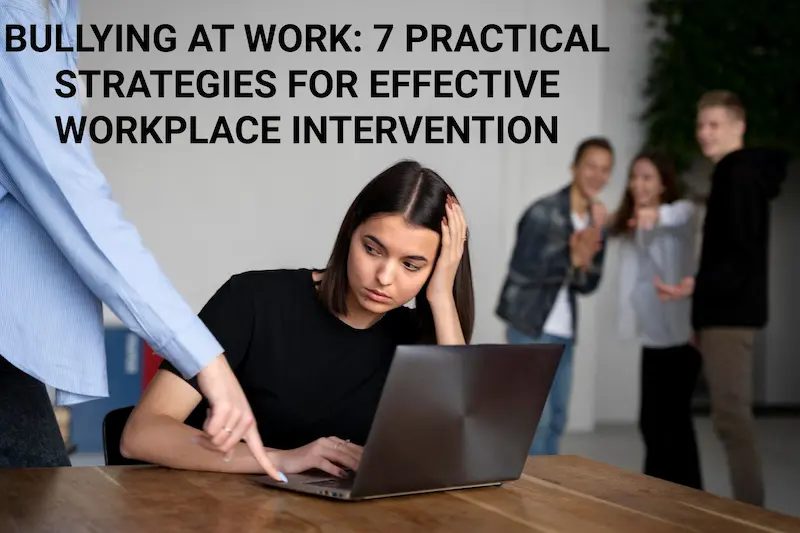Introduction
Bullying encompasses both actions and verbal remarks, which can be aimed at either an individual or a group. These are often seen as being repetitive and unwanted by the targeted individual. These behaviours can include verbal abuse, insults, constant criticism, frequent judgmental comments, and personal jokes, and can also be seen as excluding individuals from social groups. Bullying not only has psychological effects on an individual, but it also generates adverse social effects, contributing to a detrimental perception of the workplace.
Bullying At Work
Workplace bullying is common yet not discussed so often. It has also been normalised as a part of our daily work culture and has become a sad reality. It can be related to one’s work, such as criticism of one’s work, or an individual’s personal experiences, such as spreading rumours or passing judgements on someone’s opinions. It has been seen to manifest in various forms, such as minimising others’ concerns and discomfort, belittling colleagues, wrongfully claiming credit for someone else’s achievements, and engaging in name-calling. This makes the workplace environment challenging, where the targeted individuals hesitate to speak up. Individuals don’t realise that they are being bullied, and if they do, they are not able to speak about it because they conform to group norms or just want to fit in the social circles. This vicious cycle continues till the victims are affected or portrayed as difficult to work with.
Effects Of Bullying At Work
There can be significant effects of bullying on not only the individual being bullied but also the overall working environment. This can create a challenging and toxic atmosphere to work.
- It can have an impact on an individual’s psychological and emotional well-being. It not only affects their self esteem but also their motivation to work.
- This also results in them withdrawing themselves from the social circles to reduce the mistreatment.
- It can also have an impact on the individual’s ability to make decisions or concentrate at work.
- Their overall work performance and job satisfaction also tends to reduce due to the negative association formed with the workplace environment.
- This also leads to increased absenteeism and feeling the need to disengage from their professional responsibilities.
- Beyond the individual level, it can also affect relationships in the workplace.
- Not only does it impact the dynamics among the co-workers who treat others indifferently, it also affects relationships with those who are aware of the bullying behavior and acts.
Overall, it affects teamwork, the well-being, and the collaborative nature at the workplace.
Psychological Effects Of Bullying At Work
Bullying at work can have significant psychological effects on the individual being targeted. Persistent insults or mistreatments can lead to increased stress levels and feelings of uneasiness or discomfort. Due to constant criticism or excessive workload, people often report low self-esteem. Feelings of sadness and a lack of motivation to work are also observed in individuals who are frequently targeted. Workplaces can become more irritable and challenging for some people. While they might begin to withdraw, they often experience loneliness. They also tend to undermine themselves and doubt their capabilities and skills. Constant unfair treatment can result in decreasing motivation levels in an individual, contributing to a loss of joy or interest in their work. The loss of job satisfaction further affects the individual as they no longer feel motivated to work.
Dealing With Bullying At Work (7 Tips)

- Recognize bullying at work- It is crucial to understand and identify the early signs of being mistreated or insulted. It might be challenging to differentiate between constructive criticism and excessive criticism. It is essential to be aware of what is happening and then addressing it promptly.
- Don’t blame yourself- Understand that these acts are not your fault. It’s easy to fall into the loop of overthinking and believing that you deserve such treatment. Bullying or mistreatment is normalised, and quite often, the bullies are not even aware of the fine line between joking and affecting someone’s feelings.
- Set boundaries- Communicate clearly about your boundaries to the person who is engaging in bullying behaviour. Address your concerns in a polite yet assertive way to make the bully understand their actions. Most often, the bullies are not aware that one is getting affected by their remarks.
- Seek Support- It is of utmost important to talk to your fellow colleagues, friends and family members about what you are feeling. Discussing what you are experiencing can help you to gain another perspective and provide emotional support.
- Know your Rights- It is crucial to know what your rights are while working at your company or organisation. You can get help from the Human Resources department regarding this.
- Report the bullying- If the bullying persists, report it to your manager/ supervisor or another appropriate authority of your organization. Follow the prescribed procedure of your company to report and document bullying at work.
- Engage in Self-Care- Prioritize taking care of yourself. Engage yourself in doing activities that help to reduce stress and rejuvenate your own well-being.
Conclusion
Hence, bullying at work is one of the most common yet not discussed and reported by the workers. It is still normalised in our work culture to pass judgements and comments on someone’s work or their personal opinions. The targeted individuals have an impact on their psychological and emotional well-being. They often feel lonely as they start withdrawing themselves from the social circle to break the bullying cycle. Individuals also have reduced self-esteem and less motivation to work. They tend to lose interest in their jobs, which leads to decreased job satisfaction. It is important to understand the early signs of bullying and act accordingly.
References
Redirect. (2021, July 2). Bullying in the workplace. Redirect. https://www.nidirect.gov.uk/articles/bullying-workplace
Praslova, L. N. (2023, January 3). How bullying manifests at work – and how to stop it. Harvard Business Review. https://hbr.org/2022/11/how-bullying-manifests-at-work-and-how-to-stop-it
Rayner, Charlotte & Sheehan, Michael. (1999). Theoretical approaches to the study of bullying at work. International Journal of Manpower. 20. 11-16. 10.1108/01437729910268579.
Raypole, C. (2019, April 29). How to identify and manage workplace bullying. Healthline. https://www.healthline.com/health/workplace-bullying









